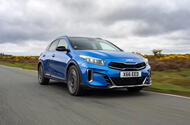
Kia’s more rugged crossover is still a viable option, despite being outshone by the more popular Sportage
There was a specific period in time the Kia Xceed was designed for during which the popularity of C-segment hatchbacks ebbed away in favour of SUVs of similar length but greater height. Perhaps, if a car was to embody the essence of a crossover, the Kia Xceed is it.With the benefit of hindsight, it’s remarkable how quickly the process occurred given the Mk3 Kia Ceed upon which the Xceed is, unsurprisingly based, fell off family car buyers’ shopping lists, leaping instead to the Sportage without their feet even touching this stepping stone.Ultimately, it’s for Kia’s product planners and motoring historians to ponder why that was, but surely that the Xceed merely looked like a more interesting design proposal for the Ceed rather than a model in its own right, can’t have helped.What also won’t have helped was the Xceed going on sale around the same time as the Ford Focus Active — a model far more profitable for its maker due to the bodywork being exactly the same, save for some clip-on chunky plastic mouldings.Save for the front doors, the Ceed’s bodywork isn’t at all interchangeable with the Xceed’s, even if its front-wheel drive-only underpinnings largely are.Even within Kia’s own range, the Xceed’s position seemed confusing, because at the time of its launch there were already three other SUVs in the line-up smaller than the Sportage — the conservative Stonic, the oddball Soul EV and the highly efficient range of Niro hybrids, PHEVs and EVs.Just like the Ceed, the initially broad engine range available for the Xceed included turbocharged petrols from 1.0 to 1.5 litres, a pair of efficient diesels and an interesting plug-in hybrid choice. Today, just the 1.5-litre T-GDi remains, with power subdued to just 138bhp.Are there any remnants of appeal within the Xceed that other Kias can’t touch or does its lack of a defined role continue to confuse would-be buyers?
Source: Autocar